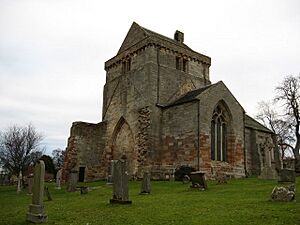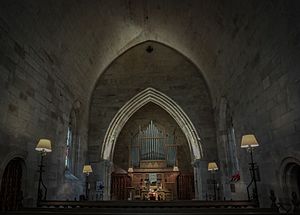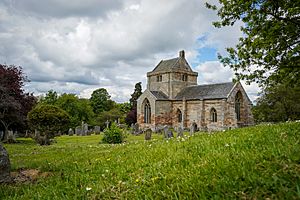Crichton Collegiate Church facts for kids
Crichton Collegiate Church is an old church located about 0.6 miles (1 kilometer) southwest of the small village of Crichton in Midlothian, Scotland. It has a long and interesting history, changing from a grand church to a ruin and then being brought back to life.
Contents
How the Church Began
Building a Special Church
This spot might have been a holy place for Christians a very long time ago. Around 1440, a powerful Scottish leader named William Crichton, 1st Lord Crichton started building a church here. He was the Lord Chancellor of Scotland, which meant he was a very important advisor to the king.
On December 26, 1449, Lord Crichton officially opened the church. He said he built it to thank God, Jesus Christ, the Virgin Mary, and all the saints. His son, James, agreed, and a bishop named James Kennedy also approved it a few days later.
What is a Collegiate Church?
Like many other collegiate churches, Crichton Collegiate Church was built for a specific purpose. It was meant for the local lord, the Crichton family, and their special prayers. A group of religious people worked there, including a Provost (the head), eight Prebendaries (priests), two choir boys, and a Sacrist (who looked after the church). Their main job was to pray for the souls of the Crichton family. The Provost received money and goods from the church lands to support them.
Church Design and Early Changes
The church was built in a Gothic and Romanesque style. This means it had tall, pointed arches and strong, rounded arches, like many old European churches. It was shaped like a cross, with a large tower in the middle. The front part of the church, called the nave, was where ordinary people came to worship.
However, the Crichton family later supported a different person who wanted to be king, Alexander Stewart, Duke of Albany. This made them lose favor with the Scottish Crown, and their lands were taken away.
During the Scottish Reformation in 1560, big changes happened in Scotland. Many churches were changed or damaged. At Crichton Church, the glass was taken out of the windows, the floor became just earth again, and beautiful stone carvings were broken. Even though the roof over the main altar was still there, the church became a ruin and was not used for services.
After the Reformation
Becoming a Parish Church
By 1569, the ruined church started being used again as the local parish kirk (church). A minister named Adam Johnston was appointed to lead the services. In the 1580s, major repair work began. However, the nave, the part where people sat, remained in ruins, and it still is today.
In 1641, the Scottish Parliament passed a law that declared Crichton Church would always be the parish church for the area. More repairs and changes happened in 1729, but people thought these were not done very well.
Bringing the Church Back to Life
More work in the 1820s helped to improve the old church. But it wasn't until the late 1800s that the church was fully restored. This big restoration was done by architects from Edinburgh named Hardy & Wright.
They added beautiful new things to the church:
- Stained glass windows made by Ballantine and Gardener in 1898.
- New oak pews (church benches).
- A pipe organ built by Joseph Brook in 1899.
Modern Times for the Church
The Church of Scotland closed the church in 1992. After that, the Crichton Collegiate Church Trust took over the property. This Trust worked hard to restore the organ, stained glass windows, lighting, walls, roof, and the tower in 1998.
Today's Use of the Church
The church, which is shaped like a "T" because part of it is still ruined, is no longer used as a regular parish church by the Church of Scotland. Instead, it is looked after by the Crichton Collegiate Church Trust, which is based in nearby Pathhead.
Today, the church is a special place used for many different events:
- Christian weddings and funerals.
- Concerts with musical instruments and choirs.
- Other cultural events.
- It is also open for visitors to explore.
A classical record company from Edinburgh, Delphian Records, often uses the church to record music. Famous musicians like The Marian Consort and guitarist Sean Shibe have recorded there. The church also holds inter-denominational services (services for different Christian groups) about six times a year. Crichton Collegiate Church is considered a Category A listed building, which means it is a very important historical building.
Location of Crichton Collegiate Church
The village of Crichton is about 1.4 miles (2.3 kilometers) west of Pathhead and 7.5 miles (12 kilometers) south of Scotland's capital city, Edinburgh.
To find the church, you leave the A68 road at the north end of Pathhead. Then, you turn onto the B6367 minor road at Crichton. You will then be on a single-track lane that has a sign pointing to Crichton Castle. Before you reach the castle car park, you will see the church on your left. It is located at grid reference NT381616.
Images for kids
 | Aurelia Browder |
 | Nannie Helen Burroughs |
 | Michelle Alexander |





